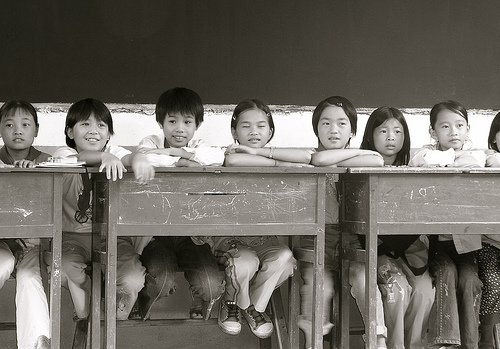
Photo courtesy of phillipsandwich on Flickr.
I don’t usually make New Year resolutions but I’m considering it. Resolutions pertaining to my role as an educator.
I’ve been spending a enormous amount of my personal time online – either reading, commenting, writing, on Flickr, Twitter, nings, my own 3 blogs, wikis (both maintaining my own and following others), a ridiculous number of groups, and trying to keep up with some of the obscenely long list of subscriptions in my Google Reader. This exercise has been the result of me jumping in, having a go, experimenting to feel for potential.
Next year is hopefully going to be different. I’d like to have more control so that I don’t feel as if I’m drowning, be more discerning and selective so that I’m not as tired or overwhelmed, and always ask ‘why am I doing this?’ and ‘is this adding value to the educational experience’.
Is this a realistic promise? I’m not sure at this point. Although I’ve really pulled back during these holidays, and I feel the benefits of this in terms of creating some headspace, I’ve also recently added Edublog winners’ urls to my rss feed. I’ve talked about not restarting a 365 photo challenge in 2010 but then joined the group EdTech 365/2010.
It’s not going to be easy. It’s going to require discipline and determination.
In terms of integrating technology into teaching and learning, I’m not going to try to change the way people think or behave. Did I really think I could change the way things operate in my school? If I did, then I was deluded. Do I think I can make a difference? You bet I do, otherwise there would be no point in me being there, or anyone else for that matter. But the difference will be in a very small way with one or two people. My resolution will be to stop spreading myself thin while my head is swivelling 360 degrees in case I miss something, and settle on less but with more depth and lots of evaluation.
I’ll make it clearer that I’m not advocating technology for its own sake, that it’s not necessarily always the best platform and, as Maria and I discovered when we taught year 7 English within a ning, it requires many more hours of teaching support and good plain discussion, and even some old-fashioned, hands-on activities, in order to make it meaningful and balanced. Our ning was never about technology, it was about connection and interaction.
On an emotional level – and I’m not sure how I’m going to do this, but it’s worth a try – I hope to take things less personally (that’ll be a first), care less about the details of things, take up fewer battles, respect difference of opinion, and understand that not everyone wants to put as much in, and that’s okay.
For anyone who reads this blog, I wish you a rich and balanced year, with new inspiration and connections with people. Since I started operating within Web 2.0 platforms for my personal and professional learning, by far the most enriching benefits have been the personal connections with people from whom I’ve learned much and with whom I”ve shared even more.

Photos courtesy of VIRGOSAMARA. Book title translates as ‘With my own eyes”.

